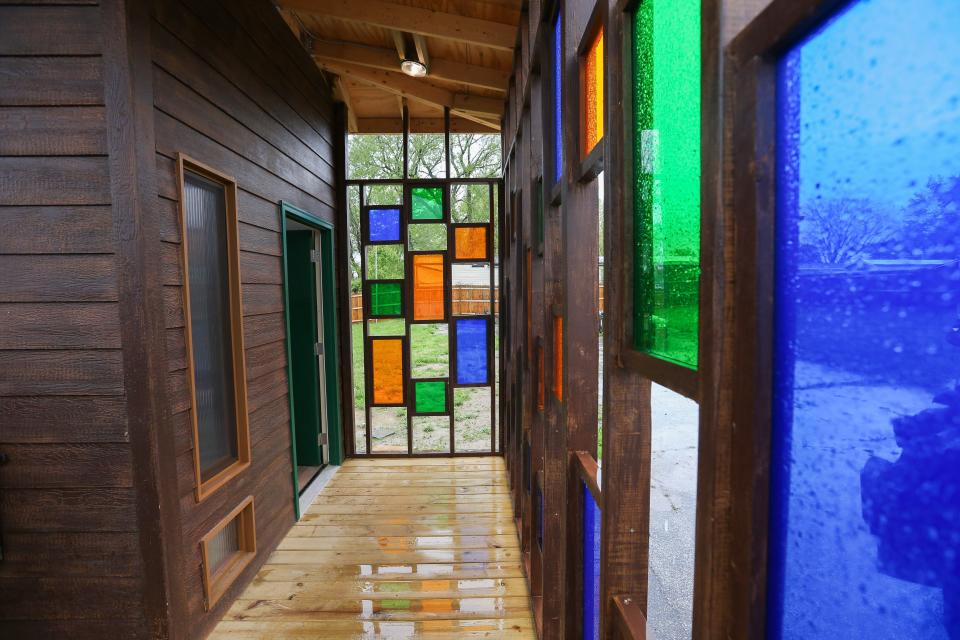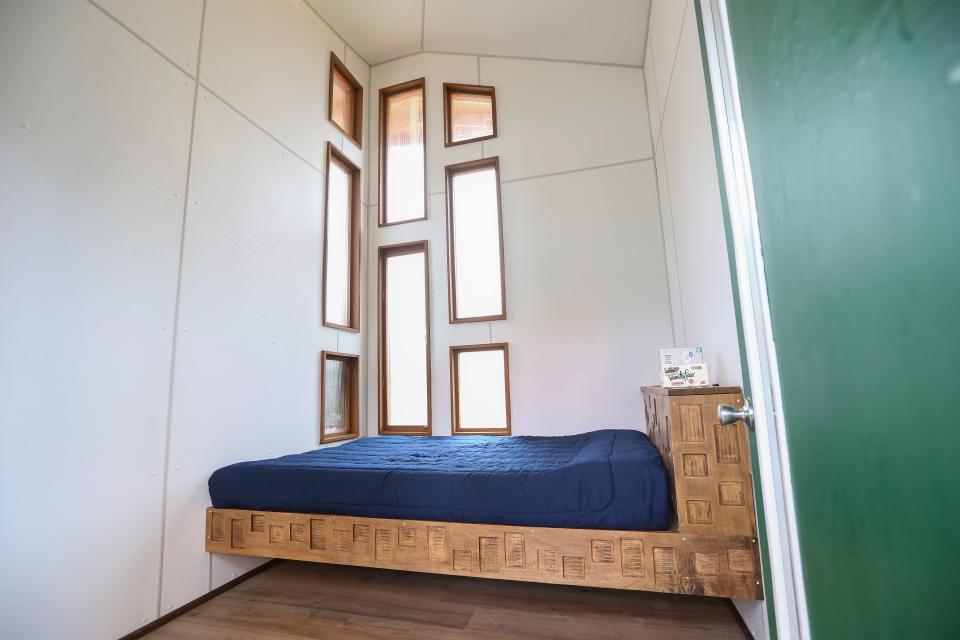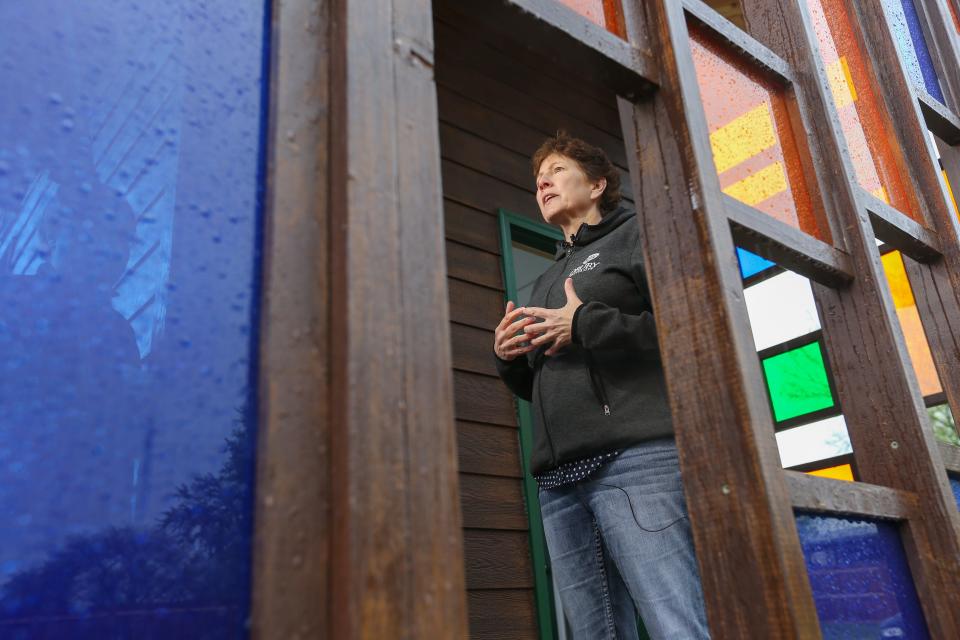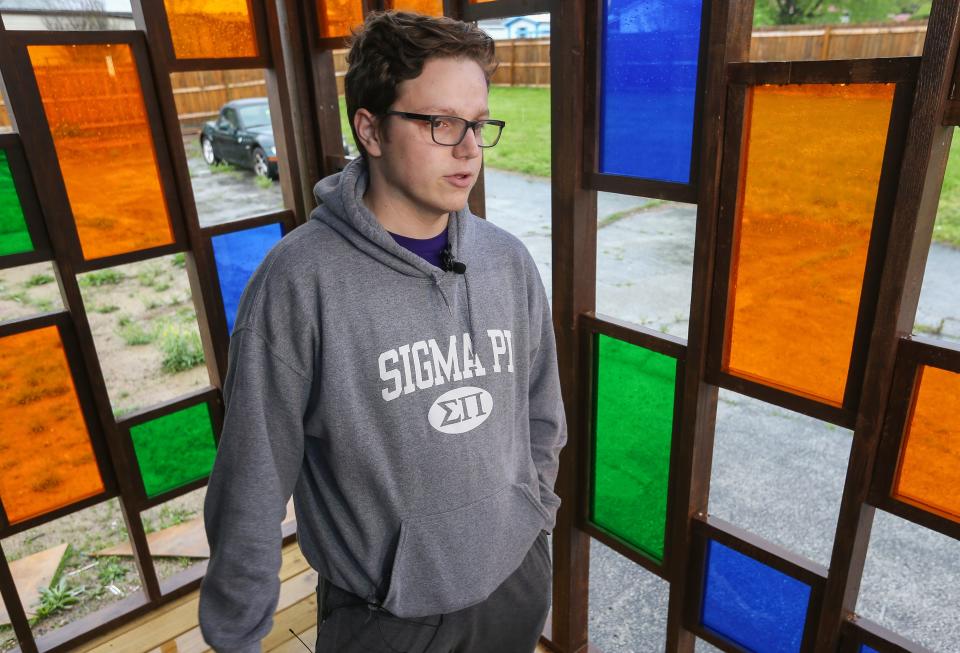'Just basic human dignity:' Drury architecture students build new tiny house at Revive 66 Campground
Ready for a cold and rainy Wednesday night, Drury architecture students and their professor unveiled a new shelter like no other at the Revive 66 Campground, a nightly stay campground for the homeless.
The shelter is both larger and more accessible than the campground's teardrop trailers — providing space for couples and those using a wheelchair for mobility.
Up the ramp to a cabin aesthetic, the shelter's outside multicolored windows will shine light in the early morning.
Inside the shelter, there is a full-sized bed with a custom-built headboard that also serves as storage for solar equipment. Heat provided through an electric radiant floor system is conserved by highly insulated walls, floors and ceiling designs.

The design for this project was inspired by Thomas Kinkade’s painting “Christmas Miracle,” featuring the refuge and subtle glow of a warm cabin on a snowy night.
The shelter is the latest endeavor of architecture professor Traci Sooter and her undergraduate students — who both designed and built the cabin.
"This is really a special project because it's helping people who are gonna lay on the ground tonight. Because of this, two less people are going to sleep outside tonight. It's raining and it's cold. And that's a big deal. I'm getting goosebumps because someone's just going to sleep in a place that's warm and safe," Sooter said at the shelter's unveiling Wednesday.

More: Springfield's crisis cold weather shelters are in 'critical' need of volunteers
The shelter isn't Sooter's first collaboration with The Gathering Tree, having worked with them on Eden Village tiny houses and other Revive 66 projects. Sooter said the nonprofit is doing "a great job at ending homelessness" in Springfield.
"They've got the tiny home villages of which we've been a part with an award-winning tiny home for them. But while folks are waiting to get their permanent home, they found the need for that Revive 66 campground so that folks can sleep outside safely on a day like today," she said.
Sooter and her students have been working on the project since last October. In that time, the Drury professor got feedback from unhoused Springfieldians who will use the shelter.

"We've been out here working on the project. And every night, homeless check in. They start lining up about three o'clock in the afternoon ... so that they can get one of the teardrop campers or one of the handicapped units. And so I've had a lot of conversations with them. And one of the things that really motivated me and kept me coming out here when it was cold and rainy, one of the ladies who was waiting outside the fence just kept saying thank you."
More: Photos: Eden Village 2 grand opening
According to Sooter, the homeless woman went on to say how rare it is to sleep outside in a place that is both wheelchair accessible and has a lock on the door at night.
"Without those things, how can anyone feel safe?" Sooter said. "That's just not asking for a whole lot. You know that's just basic human dignity right there."
In addition to designing the shelter, Sooter's undergraduate students built the cabin with the assistance of professional contractors. She hopes the young adults gained practical skills along with the knowledge to design a building — and the experience of helping some of the least fortunate within Springfield's community.
"It's a great experience for our students to be exposed to folks that are doing things like this and giving back to their community. So that's one of the things that they're learning not just architecture, but that human beings give back to our communities."

One of her students is Cody Lewis, a sophomore architecture major at Drury. It was a
"humbling experience" to work with Springfield's unhoused residents, he said. According to Lewis, his fraternity began volunteering at Revive 66 since taking on this project for his class.
"I'm here at this campground every weekend doing volunteer hours, along with some guys from my chapter. So really I'm just trying to do anything I can to help people that are less fortunate because you don't really realize how good you have actually it until you see some of the conditions that people are living in," Lewis said.
As for the shelter itself, he felt most proud its a space that a person can go by and think "woah, that's cool!"
"The main thing that I know that they're gonna have shelter, a roof over their head, as compared to an overpass or whatever. It's a real solid structure. So they can feel safe. Really one of the main things that the transient population wants is a door that can lock so they feel safe. They just want someplace safe to stay so they don't have to live every day fearing for what will happen," he said.
Gates to the Revive 66 campground open at 8 p.m. daily. All shelters, including the cabin, can be rented for $10 a night by anyone, including those who are homeless.
If someone doesn't have the $10, gift cards/vouchers are available. Unlike a traditional homeless shelter, no ID is required and pets and couples are welcome.
The ADA-accessible shelter began serving homeless residents Wednesday night and is available each night for any couple who rents it.
This article originally appeared on Springfield News-Leader: New homeless shelter at Revive 66 — built by Drury students

